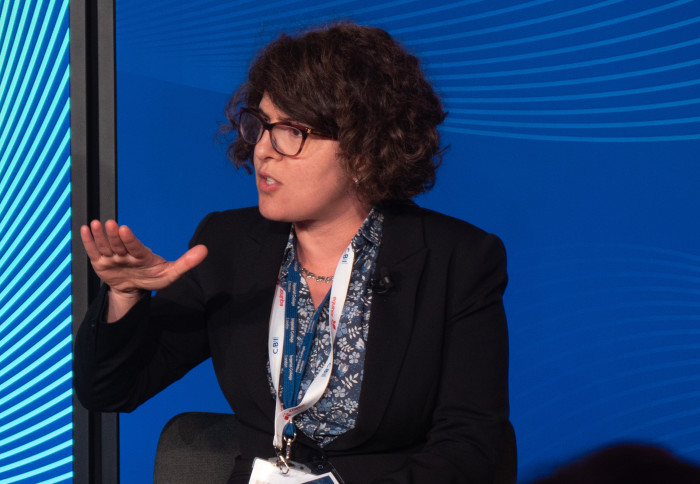Determination and focus needed for successful COP27 says Imperial climate expert

An expert conference panel featuring Imperial’s Alyssa Gilbert expressed their hopes for an inclusive and ambitious COP27 climate summit.
Instead of the usual emphasis on “optimism” ahead of the COP27 international climate change negotiations this November, there needs to be “determination and focus” to take action on climate change in a challenging geopolitical context, said Alyssa Gilbert, Director of Policy and Translation at Imperial’s Grantham Institute – Climate Change and the Environment, at the Confederation of British Industry (CBI) Achieving Net Zero conference last week.
Ms Gilbert connects the Grantham Institute’s climate change and environment expertise with policy-makers, businesses and other stakeholders and has attended COP summits as part of Imperial College’s delegation. She discussed her hopes and expectations for COP27 which will take place in Sharm el-Sheikh in Egypt alongside fellow panel members Mary Robinson, Adjunct Professor for Climate Justice at Trinity College Dublin and former President of Ireland and UN High Commissioner for Human Rights, and Lord Karan Bilimoria CBE, DL, President of the CBI, and Zahra Bahrololoum, EVP and CEO UKI at Salesforce.
The COVID-19 pandemic and cost of living and energy crises have meant that countries, including the UK, have been “slipping” on climate action and not doing enough in the lead up to COP27, said Mrs Robinson, who gave the keynote speech at the launch of Imperial’s Transition to Zero Pollution initiative in 2020 and is a renowned global climate justice advocate.
However, the panellists emphasised that international leaders must not lose sight of climate change action in the face of other challenges. Ms Gilbert stressed that the overlapping climate change and nature crises will always be an “underlying, long-term problem” which compounds other issues and therefore must be prioritised.
Hopes for COP27: inclusion and just transition
The disruption to natural, economic and social systems worldwide caused by climate change – including more frequent and severe extreme weather events, damage to infrastructure and ecosystems, and adverse impacts for human health and development – will worsen if greenhouse gas emissions are not drastically cut to limit further planetary warming. The COP summits are the main forum for bringing countries together to discuss and negotiate a coordinated response to climate change to limit further warming as far as possible and avert the most severe impacts.
Reflecting the summit’s location, COP27 is expected to focus on climate impacts and adaptation in Africa, a continent currently facing the combined effects of climate change, the food, fuel and fertiliser shocks triggered by Russia’s invasion of Ukraine and the COVID-19 pandemic.
The panellists expressed their hope that COP27 will focus on the need for a just transition to net zero greenhouse gas emissions which is equitable for all countries and populations, with the costs and benefits of reducing emissions being shared fairly.
The panellists were also hopeful that this COP will be “inclusive.” For Ms Bahrololoum, “centring and amplifying youth voices” and those of “citizen change agents” is a key priority.
Echoing Mrs Robinson’s hope that the summit will facilitate intergenerational conversations, Ms Gilbert highlighted the work of the UK Universities Climate Network, of which she is co-chair, in collaborating with Egyptian counterparts on an ambassador programme to provide opportunities for youth engagement.
Mrs Robinson emphasised that COP27 must focus on the implementation of commitments made at COP26 and spoke of her commitment as chair of The Elders group to “speak truth to power” to advocate for the ambitious action required.

Climate finance and energy
The provision of climate finance to support countries to adapt to the impacts of climate change and recover from infrastructural damage is a key issue which remained unresolved at COP26.
Ms Gilbert said that it would be particularly “powerful” to see bilateral collaboration and parallel action from the United States and China on this issue. She emphasised that climate finance would be key to empowering developing countries to take leadership and build a fossil fuel-free future. “Let’s help [these countries] to construct the 2050s we want to see here,” with “green jobs and clean air,” she said.
While acknowledging that the transition from fossil fuels to renewable energies will not be straightforward, Ms Gilbert stressed that developed countries need ambitious targets and adaptation frameworks to move away from fossil fuels to cleaner energy sources far faster in order to compensate for places that will continue to need fossil fuels in the short- and medium-term.
Ms Bahrololoum argued that as COP26 President, the UK needs to lead the way in “leap-frogging” from fossil fuels to renewable energy.
The current energy crisis has highlighted the “need to move in a moon-shot way to clean energy” via a “just, timebound transition,” while supporting countries, particularly in Africa, to avoid the issue of stranded fossil fuel assets, Mrs Robinson said.
The Achieving Net Zero conference was organised by the CBI, of which Imperial College London is a member, and was attended by industry representatives interested in the role of businesses in achieving net zero in the UK. Speeches by the UK COP26 President Rt Hon Alok Sharma MP, Lord Karan Bilimoria CBE, DL, CBI President, and Helen Whately MP, Exchequer Secretary to the Treasury, welcomed the fact that businesses are independently taking the initiative to act on climate change and highlighted the range of opportunities presented by the net zero transition, from levelling up to green jobs.
Other speakers at the conference included Chris Stark, Chief Executive of the Climate Change Committee, Ed Miliband MP, Shadow Secretary of State for Climate Change and Net Zero, and Andrea Ledward, International Biodiversity and Climate Director at the Department for Environment, Food & Rural Affairs.
Article supporters
Article text (excluding photos or graphics) © Imperial College London.
Photos and graphics subject to third party copyright used with permission or © Imperial College London.
Reporter
Siobhan Stack-Maddox
Human Resources Division